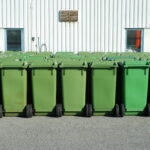 Health care businesses, such as hospitals, assisted living facilities, and skilled nursing centers, vary widely in terms of size and services, but share many common needs for diverting waste. While these facilities generate medical waste, which requires specific handling and tight control to minimize health concerns, they also typically generate a large volume of materials common in other sectors, such as cardboard, paper, bottles and cans, and food waste. In addition, these facilities may have other specialized waste needs, including document shredding, mattresses, film and rigid plastics, disposable gloves, medical x-ray film, fluorescent light bulbs and blood pressure cuffs.
Health care businesses, such as hospitals, assisted living facilities, and skilled nursing centers, vary widely in terms of size and services, but share many common needs for diverting waste. While these facilities generate medical waste, which requires specific handling and tight control to minimize health concerns, they also typically generate a large volume of materials common in other sectors, such as cardboard, paper, bottles and cans, and food waste. In addition, these facilities may have other specialized waste needs, including document shredding, mattresses, film and rigid plastics, disposable gloves, medical x-ray film, fluorescent light bulbs and blood pressure cuffs.
Diverting Food Waste from Food Service Operations
Many health care facilities include on-site food service operations. Those facilities that dispose of one-half ton or more of food waste each week are subject to the Massachusetts Department of Environmental Protection (MassDEP) commercial organics waste ban, which requires businesses and institutions to divert this material from disposal. To determine whether a facility may be subject to this ban, use the RecyclingWorks Food Waste Estimator tool, which includes metrics for Hospitals and Assisted Living Facilities.
 Refer to the RecyclingWorks webpage on Complying with the Organics Waste Ban for guidance on implementing or expanding a food recovery program using strategies such as source reduction, donation, and diverting food scraps for composting or anaerobic digestion. Health care facilities that divert food scraps from disposal may reduce waste hauling costs as well as vermin and odor issues.
Refer to the RecyclingWorks webpage on Complying with the Organics Waste Ban for guidance on implementing or expanding a food recovery program using strategies such as source reduction, donation, and diverting food scraps for composting or anaerobic digestion. Health care facilities that divert food scraps from disposal may reduce waste hauling costs as well as vermin and odor issues.
Recycling Cardboard, Paper, and Containers
Like other businesses and institutions, healthcare facilities frequently use a single stream recycling program to collect cardboard, paper, and plastic, metal, and glass containers. In health care settings with long-term residents, such as assisted living facilities, communication with residents is key to collecting recyclable materials that are free of contamination. Ensure that residents have access to recycling in their room and share information on what materials belong in each bin. Consult the MassDEP Recycle Smart MA website for more information on materials typically accepted in single stream recycling in Massachusetts and discuss any questions with your recycling hauler.
While cardboard can be included with single stream recycling, larger facilities often find it more cost-effective to collect this material separately.
Film and Rigid Plastics
Many health care facilities generate large amounts of both film and rigid plastics. Film plastics, common in peel packs, shrink wrap, and plastic bags should never be collected with other recyclables, although they can often be collected separated for recycling. Rigid plastic items such as irrigation bottles, basins, pitchers, and trays may also be separated for recycling with a plastics recycler. View the RecyclingWorks plastic materials page for more information on recycling plastics and visit the RecyclingWorks Find-A-Recycler tool to locate plastics recyclers in your area.
Document Shredding
Paper documents may contain confidential or sensitive information that requires shredding. Shredded paper is typically not accepted in single stream recycling, however this material should not be disposed of in the trash. There are numerous businesses in Massachusetts that specialize in recycling sensitive or confidential paperwork. To find a paper shredding or document destruction service please search our database of recyclers or click here for a complete list.
Disposable Gloves
Single use gloves, including those made of latex, nitrile, vinyl, or other plastics, should not be collected with other recyclables. However, several companies do offer recycling programs for disposable gloves, including Kimberly-Clark’s Nitrile Glove Recycling Program and TerraCycle’s Zero Waste Box.
Medical X-Ray Film Recycling
Medical and Industrial X-ray films contain materials that are harmful to human health and the environment. X-ray films also contain small amounts of silver that can be recycled by businesses that specialize in silver recovery. The amount of silver in x-ray film is so small that the minimum amount of film required to process is around 50 pounds. Facilities with less than 50 pounds of X-rays should contact local hospitals, which may be willing to accept old X-rays free of charge. Some processors may also be willing to accept small quantities of film free of charge if they are shipped to their processing facility. For organizations with quantities of X-rays greater than 50 pounds, X-ray recyclers are listed below.
X-ray recycling companies
B.W. Recycling
B. D. Associates, Inc.
Greymart
If your organization processes X-ray film for recycling and would like to be added to this list, please email RecyclingWorks.
Blood Pressure Cuff and Fluorescent Bulb Recycling
Fluorescent bulbs and some blood pressure cuffs contain mercury, which can be hazardous to human health and to the environment. The Mercury Management Act prohibits the disposal of mercury in the trash or wastewater. Please refer to the Massachusetts Department of Environmental Protection (MassDEP) Mercury Information and Keep Mercury from Rising for guidance on how to safely manage and dispose of mercury-containing products such as fluorescent light bulbs and blood pressure cuffs in Massachusetts.
Hospital resource management case study
![]() Cooley Dickinson Case Study: Learn the simple steps used by Cooley Dickinson Hospital used to expand their composting program and divert 60 tons of organic waste!
Cooley Dickinson Case Study: Learn the simple steps used by Cooley Dickinson Hospital used to expand their composting program and divert 60 tons of organic waste!
Shattuck case study: Shattuck hospital and their hauler, Save That Stuff, have been working together since 2003, resulting in a savings of $32,000 in solid waste management costs over the past ten years!
Learn more about the following business sectors:

